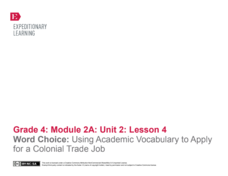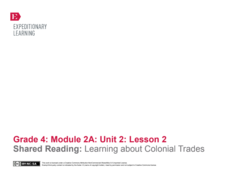Jamestown-Yorktown Foundation
Why Did Some Colonial Virginians Continue to Support the King?
Not all colonials supported the American Revolution. A resource from the American Revolution Museum at Yorktown ask young historians to investigate the reasons why some colonial Virginians were loyalist and continued to support King...
Jamestown-Yorktown Foundation
What Was Everyday Life like in Colonial Virginia?
What was everyday life like in Colonial Virginia? To find the answer cooperative groups work collaboratively to read an informational handout and complete a graphic organizer. The speaker of the group then shares their new-found...
Jamestown-Yorktown Foundation
Why Did Some Colonial Virginians Seek Independence?
To understand the reasonings of those colonials who sought independence from England, young historians are divided into content groups that examine documents related to either the Boston Tea Party, the Yorktown Tea Party, Tea Overboard,...
Elizabeth Murray Project
The Education of Women in Colonial America
What educational opportunities were available to women during the colonial era in American history? How did the opportunities available to women differ from those for men? To answer this question, class members examine a series of...
Elizabeth Murray Project
Colonial Women During the Revolution
Young researchers use the Internet or books to find out about colonial women during the American Revolution. They organize information in a graphic to demonstrate their understanding of the research they gathered before writing a...
Power Show
Colonial North America
This 54-slide PowerPoint outlines the significant events in the history of Colonial North America, beginning in 1603 with the ascendance of James I to the throne of England. Designed to accompany a lecture on this time period, the...
EngageNY
Word Choice: Using Academic Vocabulary to Apply for a Colonial Trade Job
Scholars reflect upon colonial jobs such as a blacksmith, cooper, shoemaker, etc. Together, the class writes a job application as a practice for working independently. Learners employ their experience in writing a job application for a...
Elizabeth Murray Project
Gender and Opportunity in Colonial America
What was life like for women in Colonial America? What restrictions were placed upon them and what opportunities were they afforded? A case study of Elizabeth Murray offers high schoolers a chance to investigate primary source documents...
Roy Rosenzweig Center for History and New Media
The Boston Massacre: You Be the Judge!
The importance of considering multiple perspectives of the same event is the big idea in this exercise that focuses on the Boston Massacre. Class groups examine photos of four depictions of the massacre, an English and an American...
New York City Department of Education
Colonial America and The American Revolution
How did the founding of the American colonies lead to a revolution? Use the essential question and sample activities to guide learners through a series of history lessons. Additionally, the packet includes effective strategies to...
Annenberg Foundation
Colonial Designs
The adventures of the New World came at a cost for Native Americans. Scholars investigate the economic side of settling the European colonies. Using video clips, statistical evidence, and primary sources, they create hypotheses and...
EngageNY
Shared Reading: Learning About Colonial Trades
Trading in Colonial America is the focus of a lesson plan that boosts reading skills. As a class, scholars examine the informational text for crucial details, use their newfound knowledge to share information with their peers, and write...
National Endowment for the Humanities
The Argument of the Declaration of Independence
When in the course of a course on historic American events, it becomes necessary for learners to examine, with decent respect, the Declaration of Independence, it becomes evident that there are six separate and equal parts of that...
Stanford University
Declaration of Independence
Scholars work in pairs to decide whether leaders wrote the Declaration of Independence for the rich and powerful or for every man. To draw their conclusion, pairs read excerpts from two historians and complete a graphic organizer citing...
Stanford University
Captain Cook
Known as the first European to see places like Australia and New Zealand, Captain Cook led the way for the English into the world of exploration. A primary source image of Cook's firsthand account of his voyages and discussion questions...
Huntington Library
Everyday Life - Exploring the California Missions
Young scholars relive history as they examine primary sources that document everyday life in the California missions. During a class viewing of the included slideshow presentation, children analyze documents, paintings, and drawings in...
9/11 Memorial & Museum
The Destruction and Rebuilding of the World Trade Center
How did an investigation into the causes of the collapse of the Twin Towers, as a result of the 9/11 attacks, inform the construction of the new 1 World Trade Center? That is the central question of a resource that asks class members...
Memorial Hall Museum
Dedham Deed
Class members examine primary source documents that expose the contrasting views of land ownership between the Pocumtuck and English settlers.
National Woman's History Museum
Create your own Women’s History Museum
Celebrate Women's History with a museum display. Divide the class into seven groups and assign each a different historical topic/time period. Each group member researches a different woman of that time period and creates an exhibit that...
Curated OER
Modern Interpretations
To conclude an eight-lesson study of the events that occurred in the early colonial period in Deerfield, Massachussetss, class members evaluate the point of view and bias found in late 19th and early 20th century retellings.
San Antonio Independent School District
Breaking Down the Declaration of Independence
Are learners heavy sighing at the idea of reading a primary source, written in a language that is difficult to understand and in cursive? Look no further, because the resource breaks down the Declaration of Independence in an...
Carolina K-12
“Stealing a Little Freedom”: Slave Runaways in North Carolina
As part of a study of slavery during the US colonial period, class members investigate why enslaved people ran away, the risks inherent in escaping, and the methods used to locate them.
Alabama Department of Archives and History
La Mobile: A Case Study of Exploration and Settlement
The Le Moyne brothers, Jean-Baptiste and Pierre, were among the first explorers of the Gulf Coast. Class members read biographical information and journal entries about these men, study maps showing where the settlements they established...
Channel Islands Film
Once Upon A Time (Saxipak’a): Lesson Plan 1
As part of a study of the history of the Chumash on California's Channel Island chain, class members view the documentary Once Upon a Time, respond to discussion questions, and create a timeline for the different waves of migration.

























